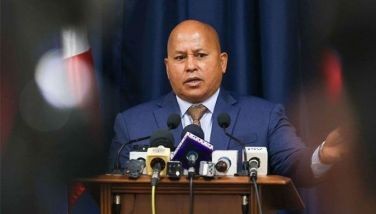China ready to 'do the right thing'

MANILA, PHilippines - The ZTE scandal has been “a learning experience” for both China and the Philippines, and Beijing is ready to move on, according to Chinese Ambassador Liu Jianchao.
But the Philippines should lead the way in the proper process of doing business in the country, Liu told The STAR in an interview ahead of the 60th anniversary of the People’s Republic of China on Oct. 1.
“We hope to get things done within the legal framework of the country,” Liu said, adding that China is prepared to “do the right thing.”
“But it should be the Philippines that should tell us what is the right way,” he said.
Public bidding for government contracts? “Okay,” he said, “we can do that.”
Transparency? “We want all projects to be clean, to be transparent, and to be acceptable to all sectors of (Philippine) society,” he replied.
The 45-year-old Liu, former foreign ministry spokesman and head of the ministry’s information department, emphasized that bilateral relations are strong in all aspects.
He noted that the two countries share the same positions on many international issues such as climate change and the financial crisis, and cooperate in many aspects including fighting terrorism and transnational crime.
About 160,000 Chinese visited the Philippines in 2008, and the number is up by 30 percent so far this year. The two countries are currently working on an agreement for the mutual recognition of academic degrees.
Chinese President Hu Jin-tao has emphasized the need to increase aid to developing countries. Chinese grants are given mainly to the poorest countries, although the Philippines has received a minor share of about $4 million.
Liu said the Philippines is the largest recipient of Chinese concessional loans, amounting to $1.8 billion from 2005 to 2010. But Philippine utilization of the loan is on hold because of the aborted $329-million ZTE deal, which was supposed to be financed by China’s Export-Import Bank.
Liu admits that the ZTE bribery scandal was “a negative, divisive issue.”
“But it does not really affect the aspirations and desire of the two governments to strengthen relationships,” he said.
Unlike other foreign sources of loans and official development assistance (ODA), China does not attach conditionalities to its aid, such as requiring transparency or democratic reforms. Beijing considers such conditionalities as intervention in the internal affairs of a sovereign state.
But the absence of such conditionalities, plus the lack of a monitoring system to ensure that its loans and grants are not misused, have made China an ideal source of foreign funding for corrupt regimes in developing countries.
Chinese loans in fact also carry one requirement: the contractors must be Chinese.
In the case of the national broadband network project in the Philippines, the winner was Shenzhen-based ZTE, or Zhongxing Telecommunication Equipment, China’s largest in this field and one of its multinational companies.
Liu said Chinese companies were “upset” by ZTE’s experience in the Philippines.
“But I think the Chinese government and companies have a long-term view of bilateral cooperation,” Liu said. “Although upset, they are still enthusiastic and interested about working with the Philippine side.”
Several Chinese projects in the Philippines are on track, among them the $90-million Agno River Integrated Irrigation Project and the $100-million water utility aqueduct along the same river.
ZTE was not investigated by China for the botched broadband deal, Liu said, because “we were never asked to investigate” by the Philippines.
“This is a learning experience for all the parties,” Liu said.
- Latest
- Trending






























